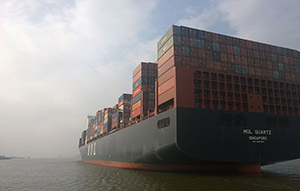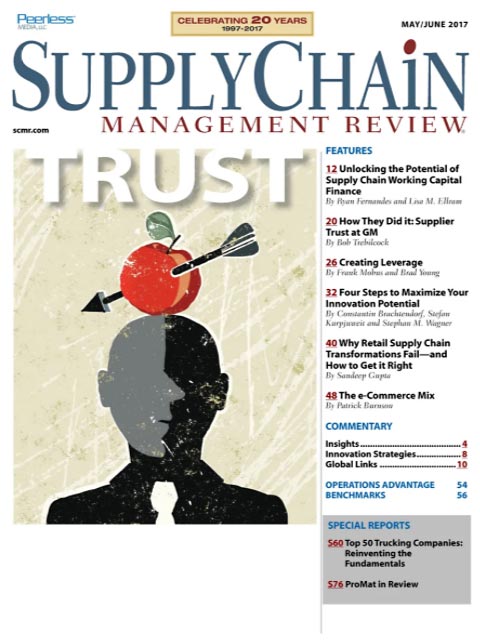Sorry, but your login has failed. Please recheck your login information and resubmit. If your subscription has expired, renew here.
May-June 2017
Trust hasn’t always been an element in supplier relationships; all too often buyers have been encouraged to carry a big stick and get tough with suppliers to get the best price—no matter the cost. That approach to procurement is beginning to change. Browse this issue archive.Need Help? Contact customer service 847-559-7581 More options
The world of politics is poised to collide with the supply chains of increasingly globalized U.S. companies. The Trump administration has identified trade and treaty reform as two of its top priorities, but how that will translate into specific policy or implications for international commerce remains unclear.
It takes a broad suite of tools to effectively manage a supply chain today, including everything from software and systems specializing in logistics, data analytics and inventory management to tools enabling demand forecasting, freight management and ensuring security and beyond. In fact, the supply chain manager’s traditional arsenal is overflowing with weapons designed to address any and all known obstacles.
But, what tools do you need to address the unknown? How can you indemnify your organization against change and uncertainty? How can you forecast, for example, without data?
Fortunately, tools such as game theory and scenario planning can help you manage more effectively in the face of multiple alternatives, including worst-case situations.

This complete article is available to subscribers only.
Log in now for full access or start your PLUS+ subscription for instant access.
SC
MR
Sorry, but your login has failed. Please recheck your login information and resubmit. If your subscription has expired, renew here.
May-June 2017
Trust hasn’t always been an element in supplier relationships; all too often buyers have been encouraged to carry a big stick and get tough with suppliers to get the best price—no matter the cost. That approach to… Browse this issue archive. Access your online digital edition. Download a PDF file of the May-June 2017 issue.The world of politics is poised to collide with the supply chains of increasingly globalized U.S. companies. The Trump administration has identified trade and treaty reform as two of its top priorities, but how that will translate into specific policy or implications for international commerce remains unclear.
It takes a broad suite of tools to effectively manage a supply chain today, including everything from software and systems specializing in logistics, data analytics and inventory management to tools enabling demand forecasting, freight management and ensuring security and beyond. In fact, the supply chain manager's traditional arsenal is overflowing with weapons designed to address any and all known obstacles.
But, what tools do you need to address the unknown? How can you indemnify your organization against change and uncertainty? How can you forecast, for example, without data?
Fortunately, tools such as game theory and scenario planning can help you manage more effectively in the face of multiple alternatives, including worst-case situations.
SC
MR


Latest Supply Chain News
Latest Podcast

 Explore
Explore
Topics
Latest Supply Chain News
- 2024 Warehouse/DC Operations Survey: Technology adoption on the rise
- Benchmarking the complexity of ESG reporting
- Looking back at NextGen 2024
- The Corporate Sustainability Due Diligence Directive
- How to make your CFO a supply chain superfan
- AI is moving omnichannel closer to the customer
- More latest news
Latest Resources

Subscribe

Supply Chain Management Review delivers the best industry content.

Editors’ Picks





